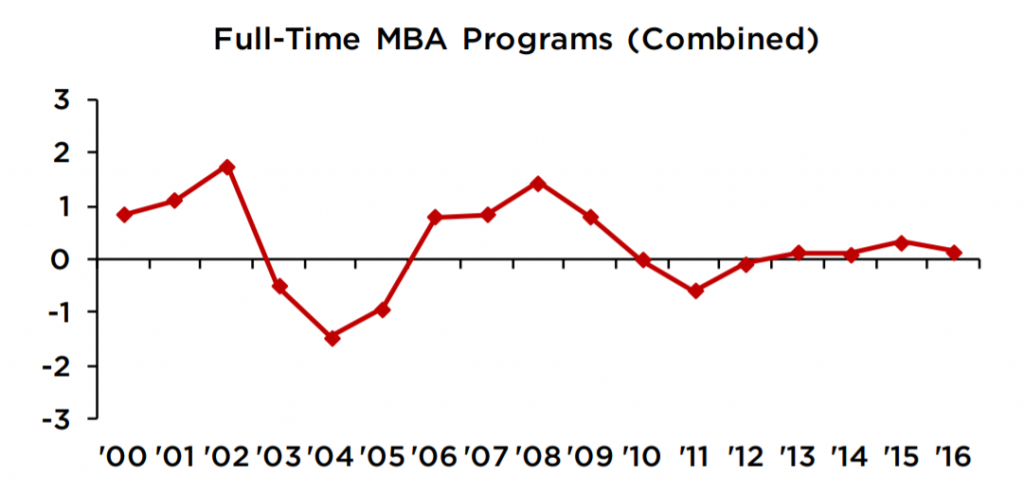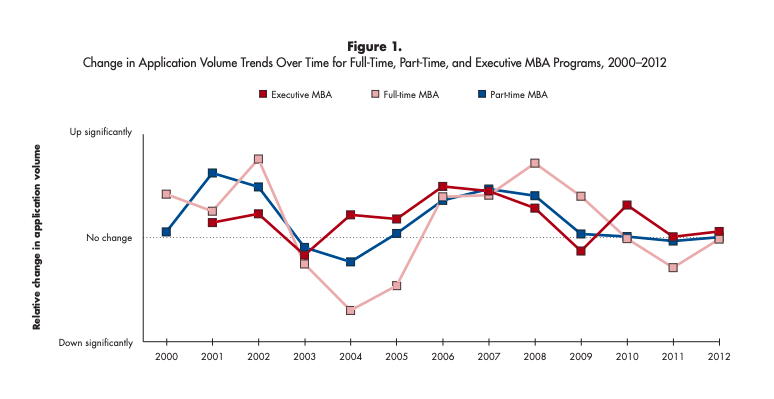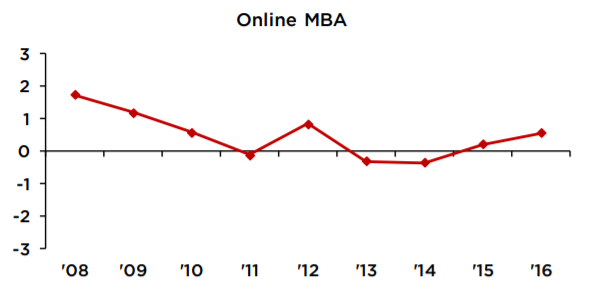Business education and coronavirus4 min read
Reading Time: 4 minutesReading Time: 4 minutesThe COVID-19 crisis will likely have a profound effect on the education sector and business education in particular. Some of these changes might actually help the industry, while others might reshape it significantly.
It’s common wisdom that recessions lead to an increase in MBA applications, because the opportunity cost of putting employment and career growth on hold for two years is lower. In this century, the only times when we saw a sharp increase were in 2001 and in 2008. The hard truth, though, is that both of these spikes were followed by decrease and stagnation.


Source: GMAC 2012 Application Trends and GMAC 2016 Application Trends
Online MBA follows similar patterns and is pretty stagnant

Source: GMAC 2018 Application Trends
Coronavirus-related recession, as it materializes, would likely not produce a similar spike in MBA applications in the US and Europe, because of the travel restrictions. This is exacerbated by the fact that with the exception of a few schools like Ross, Tepper, Marshall, Kenan-Flagler and a few others, none of the elite schools started offering comprehensive online MBA programs.
In 2018, out of almost 250,000 GMAT exams taken, almost 30% were taken by Chinese citizens. But in February, China cancelled all GRE and GMAT testing. Business schools cancelled MBA trips to China and other location globally; campuses were closed and some switched to distance instruction, including NYU Shanghai. Many US campuses followed suit and completely transitioned to distance learning over the past week.
Executive education is taking a hit as well – multiple executive expeditions and international custom programs are being postponed indefinitely; international educators avoid travel and are exploring ways to deliver their programs via video-conferences.
In a recession, however, we are likely to witness cost-cutting initiatives in “non-essential” areas – and T&D certainly isn’t considered one of the essential ones, despite all the proclamations by HR departments and CEOs worldwide. This doesn’t mean that executives won’t be going to school. It’s just that they’ll be paying for it on their own. In fact, if you find yourself in a self-quarantine (or a government-mandated one), why not use this time to take an executive program online?
A growing interest towards online executive programs from corporations looking to cut costs and executives trying to entertain themselves while business is slow, will very likely be met by a fiercer competition from executive education providers which will work even harder to convert their successful face-to-face programs into online formats. Whether they do it on their own, or with the help of platforms like Emeritus and GetSmarter, we are likely going to see that online environments will get much better at mimicking in-person experiences.
This crisis is also an opportunity for local players in emerging markets to up their game and compete with established global brands which are mostly concentrated in Europe and the US with limited permanent faculty in their overseas branches. Campus magic has been a critical competitive advantage – losing it creates a more level playing field for anyone seeking to launch independent online courses taught by great faculty. These challengers would need to get creative with blended and online delivery, seek out and develop teaching talent, and respond rapidly to changing demand.
Adaptive, entrepreneurial, and passionate educators will most certainly prosper. We once worked with a professor who wasn’t admitted into a country for dubious reasons the night before he was supposed to teach a seminar to C-level executives. After spending the night at the airport and taking a red-eye to a third country, he delivered the program brilliantly over Zoom in the morning. When force majeure happens, the best find a way to make things work.
Coronavirus travel restrictions will impact diversity in classrooms significantly. Even when such restrictions aren’t mandated by governments, many potential participants self-impose them and limit their international and regional travel. Globally competitive programs tend to draw participants from all over the world, from different industries, and functions. We build partnerships and lifelong friendships. We learn a lot from interacting with people who are different from us – often more so than from the faculty teaching the same course successfully over many years. One has to remain hopeful, that online education platforms use this as an opportunity to increase the quality of interaction between participants – something that past participants routinely rate low even for the best online courses, according to our data.
On a final note, we hope business education comes out on the other side more technologically advanced, more responsive to societal needs, more adaptive and more diverse – with new global players and rising stars.




